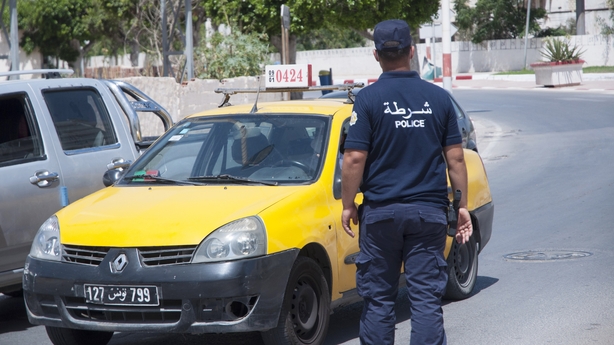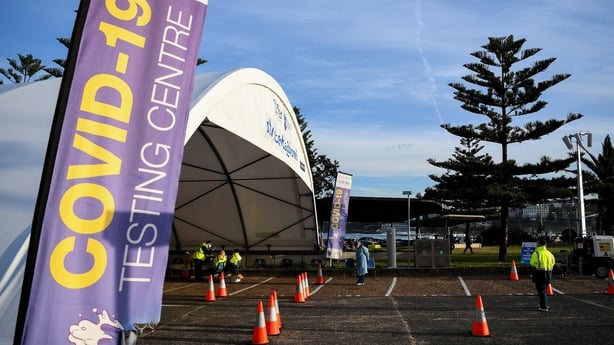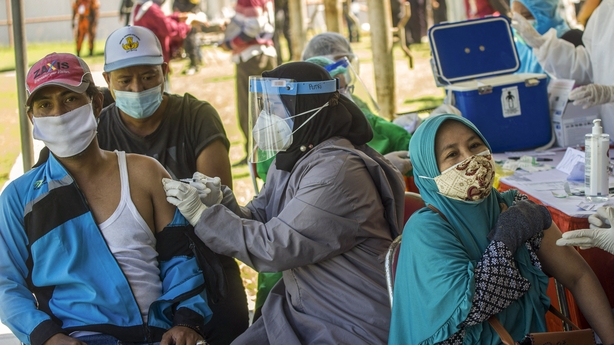Spain's northeastern Catalonia region is going to reimpose virus restrictions such as curbs on nightlife to try to tame a surge in infections that is straining health care services.
"We have to close nightlife that is not in open spaces and also impose restrictions on outdoor activities that draw many people," said the spokeswoman for the regional government, Patricia Plaja.
Catalonia, whose capital city is Barcelona, last month reopened nightclubs with 50% of capacity. Patrons had to wear face masks on the dance floor.
Coronavirus infections in Spain have risen by 32,607 since Friday, official data shows, 85% more than the previous weekend's increase as the Delta variant drives a surge among unvaccinated young people.
Other European countries, including Ireland, have opened up vaccination to younger adults, but Spain has been working through age groups, meaning that most young people have yet to be inoculated.
Some 89% of Spaniards over 40 have received at least one dose, compared with just 14% of 20-29 year olds.
"Right now we are in a delicate situation in terms of transmission, but at least it is not being reflected in terms of severe cases," Health Emergency Coordinator Fernando Simon told a news conference yesterday.
Before infections began ticking up in mid-June, contagion had fallen steadily since April, prompting the Spanish government to lift a requirement to wear masks outdoors and ease other restrictions.
But Catalonia has now decided to reimpose restrictions on nightlife and social events.

Hospitals in Tunisia struggle with Covid 'tsunami'
Tunisian hospitals are battling to keep operating as the number of people dying with Covid-19 spikes and bodies are left in rooms because mortuaries are running at full capacity.
"Some patients have died without us realising it," said Imen Fteiti a nurse at the Ibn Jazzan hospital in the central city of Kairouan, one of the hardest hit by the pandemic.
Some bodies of Covid victims have been left lying in rooms, next to other patients, for up to 24 hours because there were not enough staff to organise their transfer to overstretched mortuaries.
Tunisia has officially recorded more than 15,000 deaths since the start of the pandemic last year with the toll rising in recent weeks.
More than 600 Covid patients are in intensive care units around the country, and authorities have set up field hospitals to cope with a crisis they have compared to a "tsunami".
Doctors, nurses and non-governmental organisations have sounded the alarm particularly for Kairouan, a marginalised region where intensive care beds and oxygen supplies are lacking.
"We have reached a point where we don't know who to assist first," Ms Fteiti said.
In Kairouan, 5,500 litres of oxygen are now needed daily to treat those stricken by Covid compared to 400-500 litres two weeks ago before the number of cases spiked, regional health officials said.
Slah Soui, a doctor at Kairouan's second largest hospital Aghlabides, blames the situation on "recklessness" and people failing to respect hygiene rules, including social distancing.
But "a severe lack of vaccination" is also at fault, he said.
Tunisia has struggled with a lack of vaccines and launched its campaign in March, a month later than planned.
In the Kairouan region, just 95,000 people have registered to be vaccinated and only half of those have received a first dose.
Across Tunisia, only 4% of the population of 12 million have received the full two doses.
Drop in infections in Sydney, Australia
The premier of New South Wales (NSW) in Australia said she aims to decide within the next 24 hours whether to extend a Covid-19 lockdown in Sydney that is due to end on Friday as new infections dropped in the country's most populous state.
Just 18 new locally acquired cases were detected in NSW today, half of the previous day's number.
But Premier Gladys Berejiklian said the decision would also take into account her administration's determination to make the current lockdown in the city of five million people the last, as it aims to step up vaccinations.

"That will factor into our decision-making as to whether it (the two-week lockdown) finishes on Friday or whether we continue for a period longer," Ms Berejiklian told reporters.
"I hope to be able to communicate to the community tomorrow on what next week looks like."
With Sydney battling its worst Covid-19 outbreak of 2021, total infections in the flare-up crossed 330 since the first case was detected nearly three weeks ago in a limousine driver who transported overseas airline crew.
Record daily death toll in Russia
Russia reported a record 737 deaths from coronavirus-linked causes in the past 24 hours, pushing the national death toll to 139,316.
The country confirmed 23,378 new Covid-19 cases, including 5,498 in Moscow, taking the official national tally since the pandemic began to 5,658,672.
The federal statistics agency has kept a separate count and has said Russia recorded around 270,000 deaths related to Covid-19 from April 2020 to April 2021.
Indonesia battles Delta outbreaks
Indonesia has prepared back-up medical facilities for a worst-case scenario where daily coronavirus infections reach 40,000 to 50,000, a senior official said, as the country battles its fastest-spreading outbreak so far.
The outbreak is fuelled by the rapid spread of the highly contagious Delta variant.
Authorities reported a daily record of 728 coronavirus deaths while fresh infections topped 31,000.
The official death toll spiked from 558 virus fatalities yesterday, while new cases shot up to 31,189 from 29,745 cases a day earlier, the health ministry said.

Tougher mobility restrictions have been imposed in Java and on the island of Bali, the worst-affected regions, and the government yesterday introduced new measures in a bid to control the spread of the disease in 20 other provinces.
At a workshop located in a Jakarta cemetery, coffin maker Olaskar Purba and his team are hard at work.
They staple together boxes made of plywood and paint them brown. The coffins are then fitted with a lining and covered in plastic before being taken away for use.
"Before the (coronavirus) cases spiked, we usually made only up to 10 coffins in one day," said the 62-year-old.
"But now it has reached 30 orders per day, and it's double the work."
Fiji resists calls for national lockdown
Struggling to contain an outbreak of the Delta variant, Fiji reported a record 636 infections and six deaths today, with the mortuary at the Pacific island's main hospital already filled to capacity.
Since the pandemic began, Fiji has reported a total of 39 deaths, but most have come since the emergence of the Delta variant in April.
Located around 2,000km north of New Zealand, and with a population of less than a million people, mostly concentrated on two islands in the archipelago, Fiji had initially succeeded in keeping the coronavirus at bay.
The government has resisted calls for a national lockdown.
The infections that erupted in the past few months were suspected to have been caused by someone breaching quarantine.

